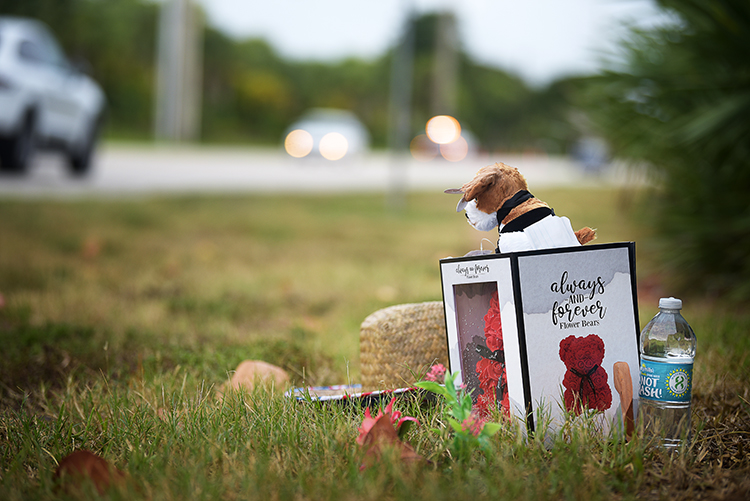
The alleged driver of the speeding car that killed 57-year-old island resident Michael Gianfresco and his dog, Molly, as they walked alongside A1A will be charged with vehicular homicide and possibly other related crimes this week, according to State Attorney Tom Bakkedahl.
That shouldn’t surprise anyone familiar with the tragic crash, which occurred shortly before 8 p.m. on Memorial Day on the grassy shoulder of the east side of the highway near Gianfresco’s home in The Dunes.
What remains puzzling, however, was the Florida Highway Patrol’s decision to not arrest Jamie Jarvonte Williams of Fort Pierce at the scene, especially since a loaded handgun and bag of marijuana were found near the car that a sheriff’s deputy clocked in excess of 100 mph before it veered off the roadway and violently struck Gianfresco.
Not only did the FHP seem to have probable cause to charge Williams with reckless driving, but troopers also could’ve arrested him for violating the terms of his probation in connection to a 2018 felony conviction in St. Lucie County.
In fact, a sheriff’s deputy at the scene handcuffed Williams and one of his passengers and put them in the backseat of patrol vehicles until the FHP arrived and took control of the investigation.
But in his report, the deputy stated the FHP instructed him to release Williams, who requested – and was given – a ride to a nearby convenience store.
Was the FHP unaware of Williams’ criminal past, particularly the 24 months of probation he received in July 2020 as the sentence for a no-contest plea to charges of carrying a concealed firearm, attempted tampering with evidence and resisting arrest?
Did troopers not check the conditions of Williams’ probation, which included not leaving St. Lucie County without permission from his probation officer?
Even Bakkedahl was perplexed.
“I cannot comment on that because I don’t know what happened between the Sheriff’s Office and FHP,” said Bakkedahl, whose office prosecutes crimes in the four-county circuit that includes Indian River and St. Lucie.
“Clearly, the suspect violated his probation terms, which prohibited him from leaving St. Lucie County,” he added. “I’m not sure why they wouldn’t have arrested him on the spot.”
It wasn’t until three weeks after the devastating crash – and five days after Vero Beach 32963 reported on the FHP releasing Williams despite the terms of his probation – that a sheriff’s deputy here contacted Williams’ probation officer.
Two weeks later, Williams was arrested on a warrant and remains in the St. Lucie County Jail, where he is being held without bond while awaiting a violation-of-probation hearing next week.
Bakkedahl said he didn’t know whether the newspaper story prompted the arrest, but that it’s possible someone at the Sheriff’s Office read it and realized that Williams shouldn’t have been in Indian River County.
For the record: The Florida Department of Correction has alleged that Williams left St. Lucie County without the consent of his probation officer and that he failed to disclose his crash-scene contact with law enforcement on his monthly check-in form, which he filed on June 7.
Calls from this newspaper to the FHP produced no response, which Bakkedahl said was to be expected because the agency doesn’t comment on active investigations.
But we should get answers soon.
Bakkedahl said the FHP has completed its investigation and that he received the agency’s final report last week. However, the news media won’t be given access to the report until Williams’ defense attorney files a demand for discovery.
“It should be available in the next couple of weeks,” Bakkedahl said, adding that his office, particularly Vero Beach-based Assistant State Attorney Bill Long, has kept Gianfresco’s family informed on the progress of the investigation.
As for the community’s interest in the case, particularly the FHP taking more than 100 days to conduct its investigation, Bakkedahl was empathetic, saying: “This isn’t the first time we’ve had citizens asking these kinds of questions.”
But he defended the process.
Bakkedahl described vehicular homicide cases as “probably some of the most difficult” because of the traffic aspect – speed, direction of travel, road and weather conditions, and the condition of the driver and vehicle are potential factors – as well as the information included in medical examiners’ reports on victims.
“These are relatively complex investigations,” Bakkedahl said. “There’s a myriad of analyses that need to be conducted, and we work hand-in-glove with the law enforcement agencies. It might seem like this one took a while, but it’s not uncommon for the FHP to take 60 to 90 days, with 90 days being the norm.”
Besides, prosecutors don’t want to see anyone charged in these cases until they’re confident they can get convictions.
“We discourage quick arrests in vehicular homicide cases because of all the tests that need to be conducted and all the results that need to be evaluated,” Bakkedahl explained. “Also, there are legal and procedural reasons that these types of investigations need to be complete before we make an arrest.
“Once an arrest is made, we have 21 days to formally charge the defendant,” he added. “And once we do that, the speedy-trial clock begins. So, theoretically speaking, we have to be ready for trial on the day we formally file charges.
“Otherwise, defendants can request probable-cause hearings and, without all those tests, we wouldn’t have much.”
Bakkedahl knows this crash has impacted many in our community – especially on the island – and he wouldn’t prosecute this case unless the FHP gave him what he needs to convict Gianfresco’s killer.
“We want to do a good job and obtain justice for the family,” Bakkedahl said, “and we will.”



